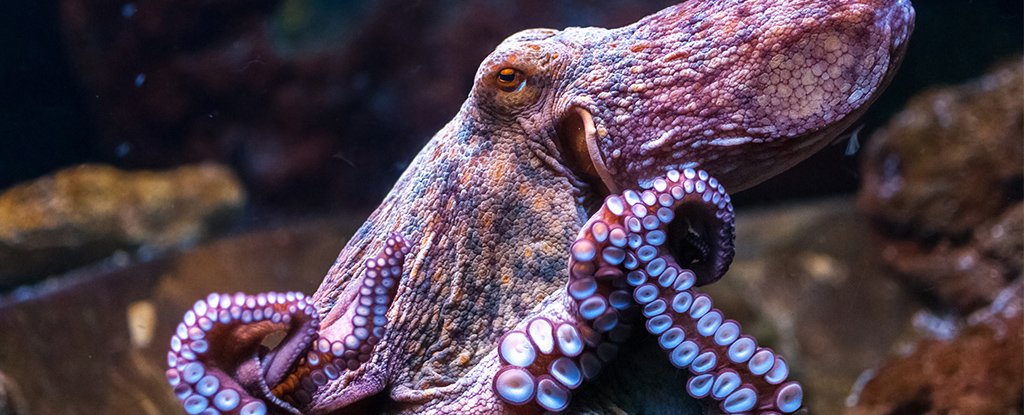
Olga Visavi/Shutterstock
NATURE
Octopus And Squid Evolution Is Officially Weirder Than We Could Have Ever Imagined
SIGNE DEAN
17 MAR 2018
Just when we thought octopuses couldn't be any weirder, it turns out that they and their cephalopod brethren evolve differently from nearly every other organism on the planet.
In a surprising twist, in April last year scientists discovered that octopuses, along with some squid and cuttlefish species, routinely edit their RNA (ribonucleic acid) sequences to adapt to their environment.
This is weird because that's really not how adaptations usually happen in multicellular animals. When an organism changes in some fundamental way, it typically starts with a genetic mutation - a change to the DNA.
Those genetic changes are then translated into action by DNA's molecular sidekick, RNA. You can think of DNA instructions as a recipe, while RNA is the chef that orchestrates the cooking in the kitchen of each cell, producing necessary proteins that keep the whole organism going.
But RNA doesn't just blindly execute instructions - occasionally it improvises with some of the ingredients, changing which proteins are produced in the cell in a rare process called RNA editing.
When such an edit happens, it can change how the proteins work, allowing the organism to fine-tune its genetic information without actually undergoing any genetic mutations. But most organisms don't really bother with this method, as it's messy and causes problems more often that solving them.
"The consensus among folks who study such things is Mother Nature gave RNA editing a try, found it wanting, and largely abandoned it," Anna Vlasits reported for Wired.
But it looks like cephalopods didn't get the memo.
In 2015, researchers discovered that the common squid has edited more than 60 percent of RNA in its nervous system. Those edits essentially changed its brain physiology, presumably to adapt to various temperature conditions in the ocean.
The team returned in 2017 with an even more startling finding - at least two species of octopus and one cuttlefish do the same thing on a regular basis. To draw evolutionary comparisons, they also looked at a nautilus and a gastropod slug, and found their RNA-editing prowess to be lacking.
"This shows that high levels of RNA editing is not generally a molluscan thing; it's an invention of the coleoid cephalopods," said co-lead researcher, Joshua Rosenthal of the US Marine Biological Laboratory.
The researchers analysed hundreds of thousands of RNA recording sites in these animals, who belong to the coleoid subclass of cephalopods. They found that clever RNA editing was especially common in the coleoid nervous system.
"I wonder if it has to do with their extremely developed brains," geneticist Kazuko Nishikura from the US Wistar Institute, who wasn't involved in the study, told Ed Yong at The Atlantic.
It's true that coleoid cephalopods are exceptionally intelligent. There are countless riveting octopus escape artist stories out there, not to mention evidence of tool use, and that one eight-armed guy at a New Zealand aquarium who learned to photograph people. (Yes, really.)
So it's certainly a compelling hypothesis that octopus smarts might come from their unconventionally high reliance on RNA edits to keep the brain going.
"There is something fundamentally different going on in these cephalopods," said Rosenthal.
But it's not just that these animals are adept at fixing up their RNA as needed - the team found that this ability came with a distinct evolutionary tradeoff, which sets them apart from the rest of the animal world.
In terms of run-of-the-mill genomic evolution (the one that uses genetic mutations, as mentioned above), coleoids have been evolving really, really slowly. The researchers claimed that this has been a necessary sacrifice - if you find a mechanism that helps you survive, just keep using it.
"The conclusion here is that in order to maintain this flexibility to edit RNA, the coleoids have had to give up the ability to evolve in the surrounding regions - a lot," said Rosenthal.
As the next step, the team will be developing genetic models of cephalopods so they can trace how and when this RNA editing kicks in.
"It could be something as simple as temperature changes or as complicated as experience, a form of memory," said Rosenthal.
The findings have been published in Cell.
A version of this story was originally published in 2017.
Learn More
'Smart' cephalopods trade off genome evolution for prolific RNA editing
Marine Biological Laboratory, ScienceDaily, 2017
RNA Editing-Based Adaption Found in Octopuses, Other Complex Cephalopods
GenomeWeb, 2017
Link: https://www.sciencealert.com/octopus-and-squid-evolution-is-officially-weirder-than-we-could-have-ever-imagined
Highlights
- •Unlike other taxa, cephalopods diversify their proteomes extensively by RNA editing
- •Extensive recoding is specific to the behaviorally complex coleiods
- •Unlike mammals, cephalopod recoding is evolutionarily conserved and often adaptive
- •Transcriptome diversification comes at the expense of slowed-down genome evolution
Summary
RNA editing, a post-transcriptional process, allows the diversification of proteomes beyond the genomic blueprint; however it is infrequently used among animals for this purpose.
Recent reports suggesting increased levels of RNA editing in squids thus raise the question of the nature and effects of these events.
We here show that RNA editing is particularly common in behaviorally sophisticated coleoid cephalopods, with tens of thousands of evolutionarily conserved sites.
Editing is enriched in the nervous system, affecting molecules pertinent for excitability and neuronal morphology.
The genomic sequence flanking editing sites is highly conserved, suggesting that the process confers a selective advantage.
Due to the large number of sites, the surrounding conservation greatly reduces the number of mutations and genomic polymorphisms in protein-coding regions.
This trade-off between genome evolution and transcriptome plasticity highlights the importance of RNA recoding as a strategy for diversifying proteins, particularly those associated with neural function.
No comments:
Post a Comment